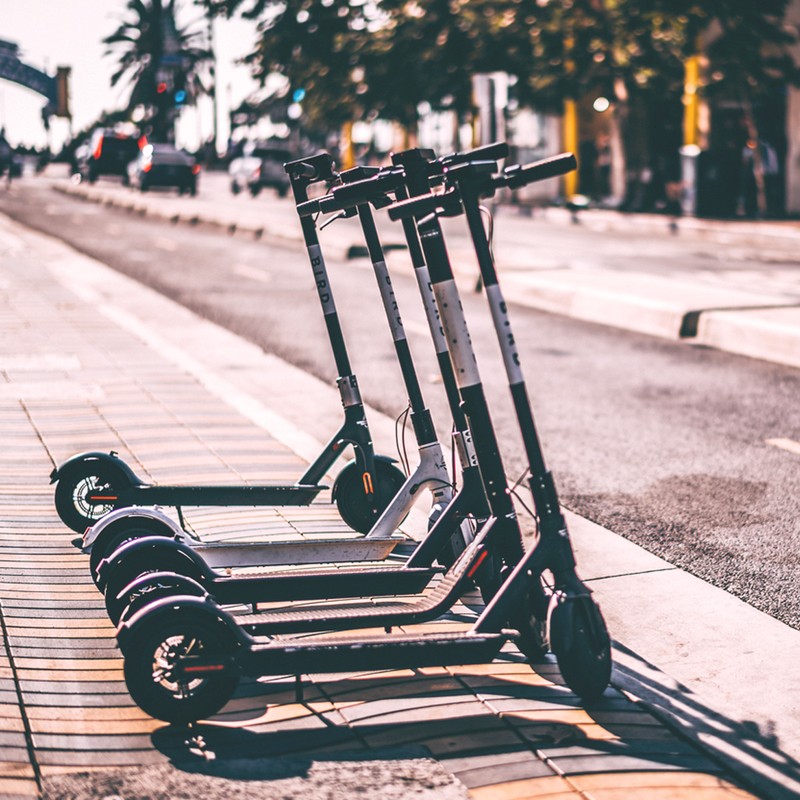Why Are There So Many Adult Scooters?
While you might spot a smattering of scooter riders here in the UK, the craze has really taken off on streets across the west coast of America, where pavements are riddled with the transportation contraptions from Los Angeles to San Francisco. Most are from Bird, a start-up run by former Uber execs, who deposited hundreds of e-scooters in 2018. They work in the same way as Ofo bikes – simply scan a scooter’s barcode and away you glide.
Last year, many were convinced that scooters wouldn’t cross over to the mainstream in the UK, but low and behold, barely a day goes by without someone knocking you into a Starbucks window as they scoot by. (This is an attitude we need to remember and learn from when the zombie apocalypse starts in America.) To buy a scooter can be pretty expensive (some will set you back around £400) but you can hire them in limited areas – Bird launched a pilot scheme of electric scooters in London's Olympic Park last year, where the paths are private. But despite the small amount of scoot-sharing, a police crackdown has already been enforced in a bid to improve road safety.
Scooters riders are essentially in a no-win situation, as they aren’t actually legal to ride on the pavement or public roads. With top speeds of up to 40mph, they are only permitted to ride on private land. In fact, if you ride them on a road, you risk being fined a £300 fixed penalty, and six points on a driving license (even if you don’t have a licence, it will automatically apply to your future license, as one 15-year-old found out.)
But equally, people aren’t all that keen having them on the pavements, either. As pedestrians, we already have a lot to deal with – pigeons, cyclists, drivers who don’t obey the laws of a zebra crossing. And now this, an unfoldable death machine that fits neatly in your favourite backpack. Research by a US organisation found there have been at least four deaths and 1,545 accidents involving e-scooters in 2018. Plus, if scooter sharing makes its way over here, it’ll be all too easy for people to drop their scooter wherever they feel like it – literally. If scooters are dropped in the middle of a pavement, that’s another grievance to add to the list. (And we don’t want to end up with a mass scooter graveyard, like China found itself stuck with.)
Plus, you look silly. Just, so silly. You can’t expect to be taken seriously in a board meeting when everyone’s seen you in your helmet, folding up your scooter in the lobby because Magda on reception insists you can’t take it through the security barrier unfolded.
But, of course, the main thing with scooters is this: how good are they for the planet? With heightened pressure on us all to reduce our carbon footprint and help climate change as we edge closer and closer to the precipice of it being too late, we need another option besides cars and public transport. Manual scooters are obviously best for the planet – the power comes from your foot. But with electric scooters, the jury’s still out. Bird’s scooters definitely have a lower carbon footprint, but their climate benefits are still a little murky. "If people are replacing a cab or an Uber or Lyft drive with a scooter, from an emissions standpoint, that's obviously a better choice," Dana Yanocha, senior research associate with the Institute for Transportation and Development Policy, told the Scientific American. "But if we're pulling people from walking or biking to scooters, then it gets a little bit more complicated, because the scooters do get charged. And the electricity from that charging could be coming from a renewable source. But it's likely coming from a non-renewable source."
So while not likely that the council will be building a scooter lane on the road anytime soon, their increasingly ubiquitous nature means it’s likely that scooters could be a crucial element to the future of urban transport, as long as we can find responsible riders to lead the way. So helmets on, people – it’s time to scoot.
DISCLAIMER: We endeavour to always credit the correct original source of every image we use. If you think a credit may be incorrect, please contact us at info@sheerluxe.com.


